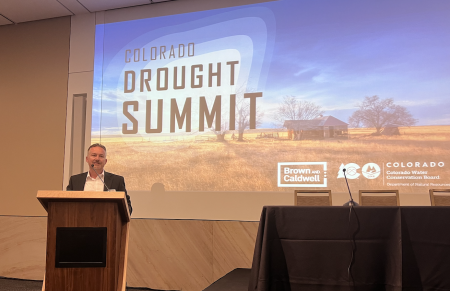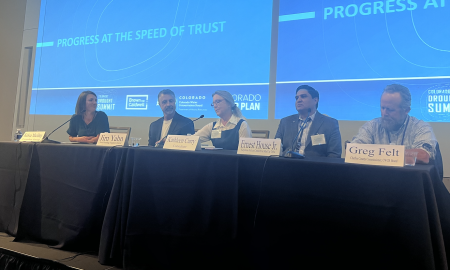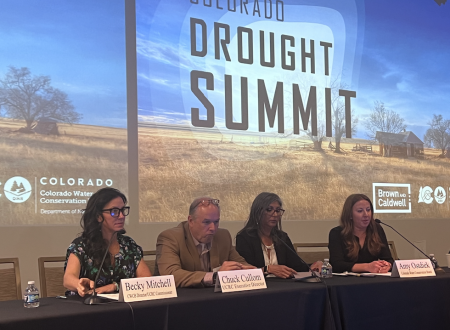This spring, the Colorado Water Conservation Board (CWCB) brought together over 200 water leaders from across Colorado to participate in a statewide drought summit. Experts from all sectors joined forces to have conversations around drought resilience and adaptive strategies for surviving deep drought across the West.
The 2023 Colorado Drought Summit, held at Denver’s History Colorado on May 31 and June 1, served as an opportunity for water leaders to evaluate lessons learned and adaptive solutions for addressing drought concerns across the state. The two-day event demonstrated CWCB's commitment to advancing the conversation around drought resilience in the 2023 Colorado Water Plan. It was the first statewide Drought Summit to be held in over a decade.
“In Colorado, we solve problems with collaboration, innovation, and grit. This concept is at the heart of the Colorado Water Plan. By working together to uplift agriculture, environment, and people across our state to ensure there is enough water for current and future generations, we can ensure a strong future for our state,” said Colorado Governor Jared Polis in a recorded message played during the Summit. “Now’s the time to evaluate where we’ve been, and answer the call to action in the Water Plan by asking what action we can take today to better prepare us for what’s ahead.”
In January 2023, Governor Polis directed the CWCB to facilitate collaboration and conversation around drought resilience. The 2023 Drought Summit provided a forum for water leaders to share ideas, past strategies, and form relationships to support a more drought-resilient Colorado.
“We know the cycle of drought, fire, and flood is continuing—these events are getting closer together and the impacts are getting bigger. Drought isn’t going away,” said Russ Sands, CWCB’s Water Supply Planning Section Chief. “This is a massive challenge that requires us all coming together to find solutions. That’s why it was so impactful to have dozens of voices from all over Colorado come together for this summit.”
See below for an overview of key takeaways from sessions held during the Drought Summit:
Day One:
- Opening Remarks, Anne Castle (University of Colorado Law School)
- We can work together to realize a better, less water-intensive future.
- Drought Planning, Gretel Follingstad (National Integrated Drought Information System)
- There are national-level tools that may be able to support local planning. NIDIS coordinates drought monitoring, forecasting, planning, and information at federal, tribal, state, and local levels across the country.
- Climate Change in Colorado, Becky Bolinger, Jeff Lukas, Peter Goble (CSU Climate Center)
- Climate models continue to agree that the future will be warmer, and we must factor this into our future planning in the state. Learn more at: climate.colostate.edu.
- Building Resilient Communities, Waverly Klaw (Sonoran Institute)
- Programs like Growing Water Smart continue to help connect land use and water planning. Learn more at the Resilient Communities and Watersheds’ website.
- Resilient Funding, Marguerite Harden (DOLA)
- The Resilience Strategy and the Water Plan both work to help realize greater resiliency for Colorado. Creative funding strategies are often needed to help advance projects.
- Surviving Deep Drought, Matt Heimerich (Farmer), Gretchen Rank (Mancos Conservation District), Andrew Petersen (Colorado Angler). Moderator - Heather Dutton (San Luis Valley Water Conservancy District)
- Ongoing drought has led to new innovations for municipal, agricultural, environmental, and recreational partners that often involve diversifying options and planning ahead—just as much as making smart decisions in the heat of a drought.
- Rethinking The Home Turf (Landscapes in Drought), Urban Landscape Conservation Task Force workshop. Jenna Battson (CWCB), Greg Fisher (Denver Water), Amy Moyer (Colorado River District), Tim York (Aurora Water), Jarrod Biggs (City of Durango). Moderator - Marjo Curgus (Del Corazon Consulting)
- Turf replacement is a critical tool in the water conservation tool box but it’s expensive and needs to be coupled with other strategies that can help realize climate-appropriate landscapes.
- Stronger Together (Climate Vulnerabilities & Disproportionately Impacted Communities), Rani Kumar (CDPHE), Raj Pandya (AGU Thriving Earth Exchange), Jessica Thrasher (Colorado Water Center). Moderator - Heather Yocum (CU Boulder/Western Water Assessment)
- Increasingly engaging with diverse communities will yield better and more collaborative solutions that can better support Colorado.
- Before the Burn (Wildfire Planning), Chris Sturm (CWCB), Brad Piehl (JW Associates), Weston Toll (Colorado State Forest Service). Moderator - Angela Boag (DNR)
- Fire has always been a component shaping Colorado’s ecosystems. Strategic planning and innovation could help create more drought and fire resilient watersheds in the state.
- From Farm to Future (Agricultural Innovation), Greg Peterson (Colorado Ag Water Alliance), Zach Thode (Farmer/Rancher), Sarah Jones (Jones Farms Organics), Hannah Cranor Kersting (CSU). Moderator - Amy Kremen (CSU)
- Collaboration, innovation, and education are imperative to creating a robust and resilient agricultural economy in Colorado’s future.
- Progress at the Speed of Trust, Greg Felt (Chaffee County Commissioner/CWCB Board), Kathleen Curry (Consultant), Jim Yahn (North Sterling Irrigation District), Ernest House Jr. (Keystone Policy Center/Ute Mountain Ute Tribe/IBCC). Moderator - Kelsea Macilroy (Langdon Group)
- Building trust is critical and it’s easy to erode—continued investments in relationships and community even amidst tough conversations is crucial to building long-term success.
Day Two:
- Opening Remarks, John McClow (General Counsel/Upper Gunnison River Water Conservancy District)
- Colorado can better meet our water challenges when we are united across basins or sectors. Our basin roundtable structure creates opportunity for collaboration and provides Colorado’s water managers guidance from all corners of the state.
- Quality & Quantity, Mazdak Arabi (CSU), Torie Jarvis (NWCOG), April Long (City of Aspen/WQCC), Jessica Brody (Denver Water/CWCB Board), Robert Sakata (Farmer/CWCB Board), Cindy Lair (CDA). Moderator - Barb Biggs (Roxborough Water & Sanitation District)
- We need to work together to develop flexible innovative strategies that help us utilize our diminishing water supply in a way that doesn’t further jeopardize our water quality.
- Storage, Conservation & Innovation, Sean Chambers (City of Greeley), Peter Mayer (Water DM), Taylor Hawes (TNC), Lorelei Cloud (Southern Ute Tribe/CWCB Board), Amy Moyer (Colorado River District). Moderator - Lisa Darling (SMWSA)
- Prolonged drought has driven hydrologic changes across Colorado leading to diminishing water supplies. Thoughtful, innovative storage and water conservation are complementary tools water managers have to stabilize water supplies.
- Fireside Chat on the Colorado River, Initial Remarks and Tribal Perspective: Lorelei Cloud (Southern Ute Tribal Council/ CWCB Board) // Upper Colorado River Commission Discussion: Becky Mitchell (CWCB Director/UCRC Commissioner), Chuck Cullom (UCRC Executive Director). Moderator - Amy Ostdiek (CWCB)
- Colorado and the Upper Basin States must stand together and speak with one voice in upcoming Colorado River negotiations.
- The Nature of Water (Exploring Nature-Based Solutions), Abby Burk (Audubon Rockies), Christina Burri (Denver Water), Brad Johnson (Consultant), Katie Jagt (Watershed Science and Design). Moderator - Kelly Romero-Heaney (DNR)
- Restoring our natural water infrastructure (headwater forests, streams, and wetlands) is critical to Colorado’s water supplies and helps create stability and drought resilience.
- Life on the Ditch (Mutual Ditches, Acequias, and More), Ronda Lobato (Costilla County/Acequia Community), Andy Pineda (Larimer & Weld Irrigation Company), Joe Frank (Lower South Platte Water Conservancy District), Tina Bergonzini (Grand Valley Water Users Association). Moderator - Matt Lindburg (Brown and Caldwell)
- Agriculture is a fundamental component of Colorado’s economy and innovation, education, and collaboration are necessary for Colorado to keep agricultural lands resilient to drought and remain in production into the future.
- The Rate of Change (Water Conservation and Rates), Fletcher Davis (Denver Water), Todd Cristiano (Raftelis), Jarrod Biggs (City of Durango), Julia Gallucci (Colorado Springs Utilities). Moderator - Peter Mayer (Water DM)
- Rates are an essential tool for water managers to incentivize water conservation efforts among municipal, agricultural, and industrial water users.
- Taking it to the Streets (Communication, Education & Drought), Greg Baker (Aurora Water), Andrea Lopez (Ute Water Conservancy District), Christina Welch (CSU), Fernando Pineda-Reyes (CREA Results). Moderator - Jayla Poppleton (Water Education Colorado)
- Education and outreach efforts are critical to creating a more resilient Colorado, and supporting a diverse next generation of water leaders.
- Growing a Drought-Resilient Future, Marianne Eppig (Urban Land Institute), Pat McMeekin (Hartford Homes), Will Sarni (Water Foundry Ventures), Paul Chinowsky (Resilient Analytics), Elizabeth Garner (DOLA). Moderator - Gretel Follingstad (NIDIS)
- Growth is an important aspect of Colorado’s economy and future. Innovative strategies for water conservation, land use, and planning is important for Colorado to continue to grow and meet our water challenges.
Visit engagecwcb.org/drought-summit to watch recordings of all sessions, view the program, or get in touch.
###


